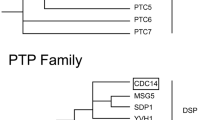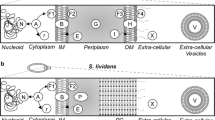Abstract
Degradation of abnormal proteins in Bacillus megaterium and Saccharomyces cerevisiae in vivo was compared with that in cell-free extracts. Protein degradation in vivo, when the cells were labelled with 14C-leucine during growth in the presence of ethionine, was affected by the concentration of the analogue used. Proteins synthesized in the presence of 0.2–1 mM ethionine were degraded most rapidly in both organisms. The proteolytic enzyme system of yeast degraded the analogue-containing proteins in vitro faster than the normal proteins. This holds also for proteins synthesized in the presence of 5 mM ethionine, whose degradation in vivo was impaired. The proteolytic system of B. megaterium, on the other hand, was unable in vitro to differentiate between normal and abnormal proteins. Denatured proteins underwent preferential degradation over normal and ethionine-containing proteins.
Similar content being viewed by others
References
Achstetter T, Ehmann C, Wolf DH (1981) New proteolytic enzymes in yeast. Arch Biochem Biophys 207: 445–464
Alix JH (1982) Molecular aspects of the in vivo and in vitro effects of ethionine, an analog of methionine. Microbiol Rev 46: 281–295
Bukhari AI, Zipser D (1973) Mutants of Escherichia coli with a defect in the degradation of nonsense fragments. Nature (New Biol) 243: 238–241
Chaloupka J, Strnadová M (1982) Kinetics of protein turnover in growing cells of Bacillus megaterium. J Gen Microbiol 128: 1003–1008
Giddings MR, Wheatley DN (1979) On the degradation of error proteins: differences between bacterial and mammalian cell systems. Microbios Lett 8: 31–46
Goldberg AL (1972) Degradation of abnormal proteins in Escherichia coli. Proc Natl Acad Sci USA 69: 422–426
Goldberg AL, St. John AC (1976) Intracellular protein degradation in mammalian and bacterial cells. Part 2. Ann Rev Biochem 45: 747–803
Goldberg AL, Kowit JD, Etlinger JD (1976) Studies of the selectivity and mechanisms of intracellular protein degradation. Miami Winter Symposia 11: 313–337
Holzer H, Betz H, Ebner E (1975) Intracellular proteinases in microorganisms. Curr Topics Cell Regul 9: 103–156
Kemshead JT, Hipkiss AR (1974) Degradation of abnormal proteins Escherichia coli: Relative susceptibility of canavalyl proteins and puromycin peptides to proteolysis in vitro. Eur J Biochem 45: 535–540
Klemes Y, Etlinger JD, Goldberg AL (1981) Properties of abnormal proteins degraded rapidly in reticulocytes. Intracellular aggregation of the globin molecules prior to hydrolysis. J Biol Chem 256: 8436–8444
Laemmli UK (1970) Cleavage of structural proteins during the assembly of the head of bacteriophage T4. Nature 277: 680–685
Liu C-J, Chopra AK, Strnadová M, Chaloupka J (1984) Degradation of abnormal proteins in growing yeast. FEMS Microbiol Lett 21: 313–317
Mäntsälä P, Zalkin M (1980) Extracellular and membrane-bound proteases from Bacillus subtilis. J Bacteriol 141: 493–501
Prouty WF, Karnovsky MJ, Goldberg AL (1975) Degradation of abnormal proteins in escherichia coli. Formation of protein inclusions in cells exposed to amino acid analogs. J Biol Chem 250: 1112–1122
Reysset G, Millet J (1972) Characterization of an intracellular protease in Bacillus subtilis during sporulation. Biochem Biophys Res Commun 49: 328–334
Swamy KHS, Goldberg AL (1981) E. coli contains eight soluble proteolytic activities, one being ATP-dependent. Nature 292: 652–654
Swamy KHS, Goldberg AL (1982) Subcellular distribution of various proteases in Escherichia coli. J Bacteriol 149: 1027–1033
Váchová-Philippová L, Chaloupka J (1978) Degradation of proteins in vivo and in vitro in exocellular proteinase deficient mutants of Bacillus megaterium. FEMS Microbiol Lett 4: 117–120
Voellmy RW, Goldberg AL (1981) ATP-stimulated endoprotease is associated with the cell membrane of E. coli. Nature 290: 419–421
Wheatley DN, Grisolia S, Hernández-Yago J (1982) Significance of the rapid degradation of newly synthesized proteins in mammalian cells: A working hypothesis. J Theor Biol 98: 283–300
Wiemken A, Schellenberg M, Urech K (1979) Vacuoles: The sole compartment of digestive enzymes in yeast (Saccharomyces cerevisiae)? Arch Microbiol 123: 23–35
Wolf DH (1981) Proteinases and sporulation in yeast. In: Turian G, Hohl HR (eds) The fungal spore: Morphogenetic controls. Academic Press, London New York, pp 355–374
Zubenko GS, Jones EW (1981) Protein degradation, meiosis and sporulation in proteinase-deficient mutants of Saccharomyces cerevisiae. Genetics 97: 45–64
Author information
Authors and Affiliations
Additional information
Participant in the UNESCO Postgraduate Course “On Modern Problems in Biology and Microbial Technology”.
Rights and permissions
About this article
Cite this article
Chopra, A.K., Strnadová, M. & Chaloupka, J. Turnover of abnormal proteins in Bacillus megaterium and Saccharomyces cerevisiae: differences between in vivo and in vitro degradation. Arch. Microbiol. 145, 97–103 (1986). https://doi.org/10.1007/BF00413034
Received:
Accepted:
Issue Date:
DOI: https://doi.org/10.1007/BF00413034




